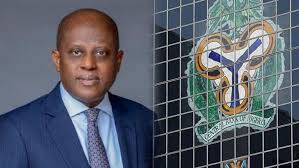The Governor of the Central Bank of Nigeria, Mr. Olayemi Cardoso, has called for stronger economic ties between Nigeria and the Middle East, emphasising the need for collaboration in infrastructure, tourism, and financial sector development.
According to a press statement by the CBN on Monday, Mr. Cardoso, who spoke on the sidelines of the inaugural Conference on Emerging Markets Economies in Saudi Arabia, with the Assistant Governor for Monetary Affairs at the Saudi Central Bank, Talal Al-Humond, to discuss potential areas of cooperation between both countries.
The statement noted Mr. Olayemi Cardoso, canvassed stronger economic ties with the Middle East and the Nigerian diaspora community in the region.
Cardoso stated that Saudi Arabia’s focus on economic diversification, large-scale transformation, and investment in tourism serves as a model Nigeria can learn from in its efforts to boost economic growth.
He reaffirmed the apex bank’s commitment to engaging with the Nigerian diaspora in the Middle East to improve remittance flows and strengthen the Nigerian financial sector.
The statement also noted that Al-Humond assured him of Saudi Arabia’s willingness to collaborate on mutually beneficial economic objectives.
During a panel discussion at the conference moderated by the Director for the Middle East and Central Asia Department of the International Monetary Fund, Jihad Azour, Cardoso provided insights into Nigeria’s foreign exchange market reforms.
He noted that the gap between the official and parallel market exchange rates, which had been as wide as 60 per cent, has now narrowed to approximately 4–5 per cent, driven by policy consistency, improved market confidence, and enhanced transparency in forex trading, the statement noted.
He stated that the adoption of an electronic forex matching system and the introduction of a foreign exchange code of ethics, signed by all Nigerian banks, have helped restore confidence in the market.
As a result of these measures, Nigeria’s foreign reserves have now exceeded $40bn, marking their highest level in nearly three years, according to the statement.
He acknowledged that Nigeria had faced significant economic challenges, including capital flow reversals, multiple exchange rate regimes, currency depreciation, high inflation, and a backlog of foreign exchange transactions, which had led to a loss of confidence in the naira.
Upon assuming office, he said, his team prioritised the restoration of market confidence by addressing the backlog of forex transactions and implementing reforms to stabilise the economy.
GIK/APA


